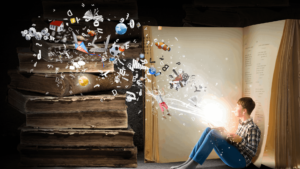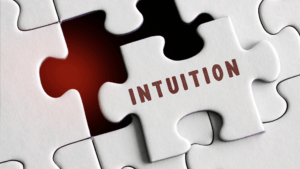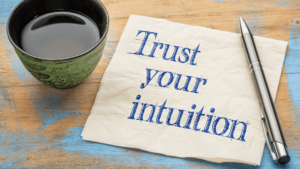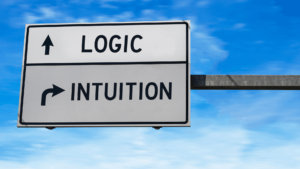Confusion Between Imagination vs Intuition: 06 Tips to Navigate

When making decisions or sensing things, it can be challenging to differentiate between our imagination and intuition. While imagination and intuition involve a sense of knowing or perceiving something, the two have distinct differences. This article will explore these differences and provide tips for navigating the confusion between imagination vs intuition.
Understanding Imagination
Imagination refers to the ability to create mental images or scenarios that are not currently present in the physical world. It is a powerful tool that can be used to visualize goals and explore creativity and problem-solving. Imagination can also construct scenarios based on fears, doubts, or worries. In this sense, imagination can sometimes lead us astray or create unnecessary anxiety.

Imagination is a vital part of the human experience. It enables us to envision new possibilities, imagine different outcomes, and explore our inner world. Without imagination, we would not have art, literature, music, or any creative endeavors that enrich our lives. Imagination is also a critical tool for problem-solving. By imagining different scenarios or solutions, we can generate new ideas and perspectives to help us overcome challenges and achieve our goals.
However, imagination can also be a source of stress and anxiety. When we focus too much on negative scenarios or outcomes, we can create unnecessary worry and fear. This is why balancing imagination with other forms of perception, such as intuition, is vital.
Understanding Intuition
Intuition is a deep, inner knowing not based on logical reasoning or conscious thought. It is a form of insight that arises from the subconscious mind, often described as a gut feeling or a hunch. Intuition is a form of guidance that helps us navigate the world around us. It can give us insights into situations, people, and decisions that are difficult to explain with logic alone.

Intuition is a natural aspect of human experience. It is the source of our creativity, inspiration, and imagination. It is also a powerful tool for decision-making, problem-solving, and navigating life’s challenges. Intuition can help us identify opportunities, recognize potential risks, and avoid unnecessary obstacles. We can tap into our inner wisdom and access new insights and perspectives by tuning into our intuition.
The Confusion Between Imagination vs Intuition-Differences
While imagination and intuition can be closely linked, the two have some fundamental differences. Here are some of the key differences:
Imagination is often based on personal desires or wishes, whereas intuition is more objective. Imagination focuses more on the future, whereas intuition focuses more on the present. It is often driven by conscious thoughts and ideas, whereas intuition arises from the subconscious. Imagination can be influenced by external factors such as media or cultural beliefs, whereas intuition is more innate and personal. Imagination can be controlled and directed, whereas intuition is more spontaneous and unpredictable.
Tips for Navigating the Confusion Between Imagination vs Intuition
Now that we understand the differences between imagination and intuition let’s explore some tips for navigating the confusion between the two.
01. Develop self-awareness:
The first step in navigating the confusion between imagination and intuition is to develop self-awareness. This involves paying attention to your thoughts, emotions, and physical sensations. Take note of when you are using your imagination and relying on your intuition. Practice mindfulness to become more aware of your mental and emotional state.
02. Practice mindfulness:
Mindfulness is a powerful tool for developing intuition. You can tap into your intuition and access your inner wisdom by staying present in the moment. Practice mindfulness meditation or other mindfulness techniques to cultivate present-moment awareness.
03. Trust your gut:
Your gut feeling or hunch is often your intuition. Trust this feeling and follow your intuition when deciding or navigating difficult situations. Trusting your intuition takes practice, so start small and work your way up. The more you trust your intuition, the more confident you will become in distinguishing between your imagination and intuition.

04. Check-in with your imagination:
Before deciding or acting:
- Check-in with your imagination.
- Ask yourself whether your thoughts are based on fear, anxiety, wishful thinking or are grounded in reality.
- Use your imagination to visualize different scenarios, but don’t let it override your intuition.
By checking in with your imagination, you can better understand your thoughts and differentiate them from your intuition.
05. Use logic and reason:
While intuition is important, it’s also essential to use logic and reason when making decisions. Use your critical thinking skills to evaluate different options and weigh the pros and cons of each. Combining intuition with logic and motivation can help you make well-informed decisions and will make an emotionally intelligent person. This will also help you avoid confusing your intuition with your imagination.

06. Practice self-reflection:
Regular self-reflection can help you better understand your thoughts, emotions, and intuition. Set aside time each day to reflect on your experiences and insights. This can help you cultivate greater self-awareness and better use your intuition. By practicing self-reflection, you can also learn to distinguish between your imagination and intuition.
Conclusion
Navigating the confusion between imagination and intuition takes practice and self-awareness. By developing mindfulness, trusting your gut, checking in with your imagination, using logic and reason, and practicing self-reflection, you can distinguish between the two and use them effectively. With these tips, you can cultivate a deeper connection to your intuition and use it to navigate life’s challenges more easily.











